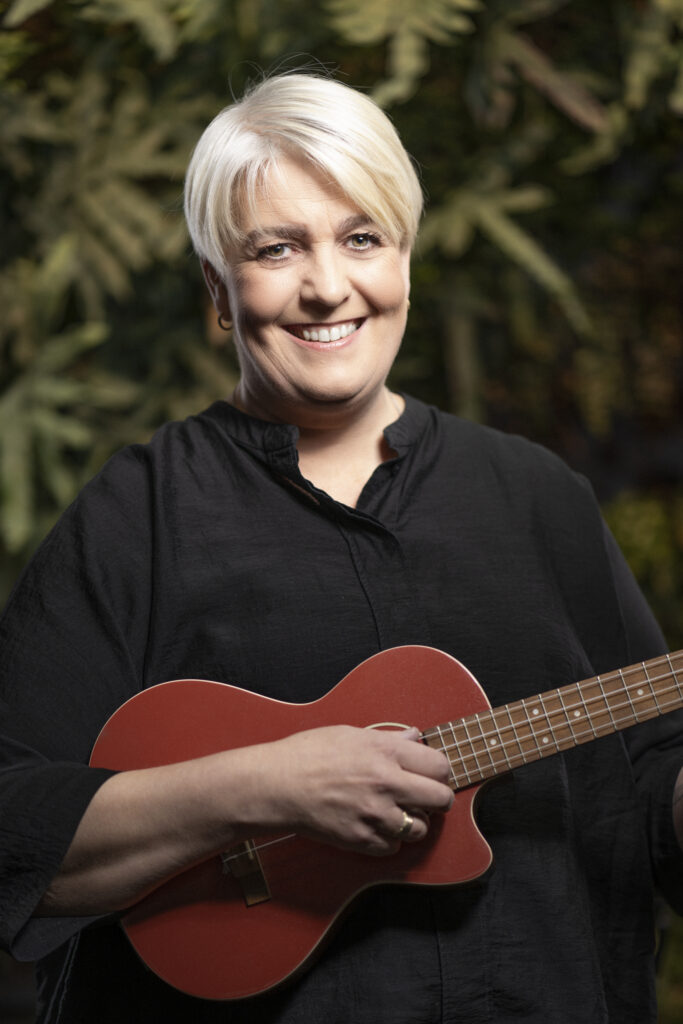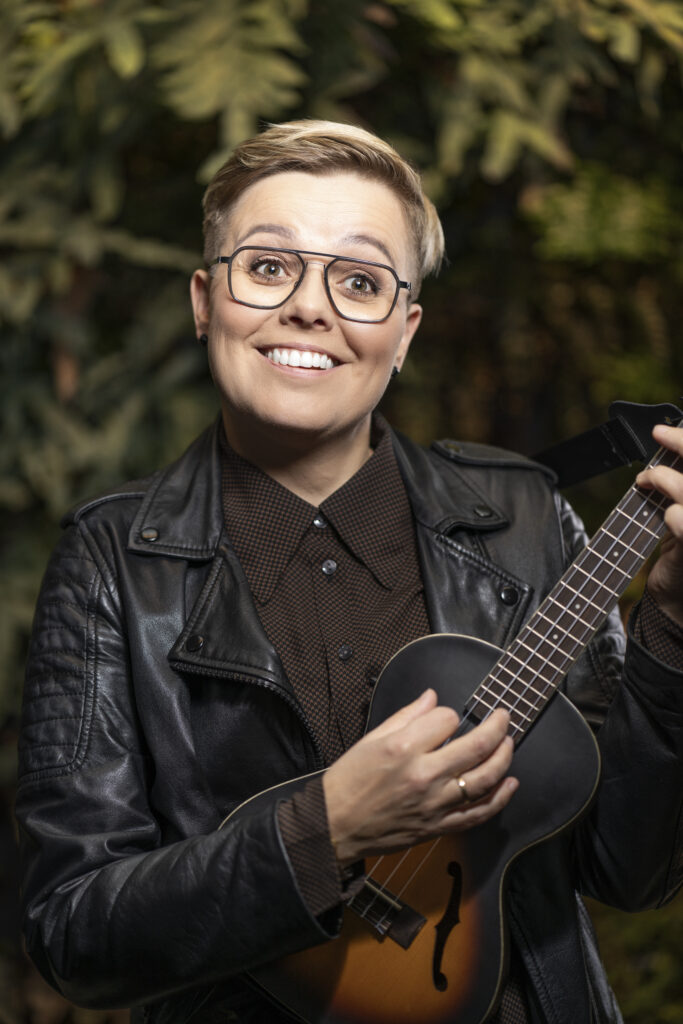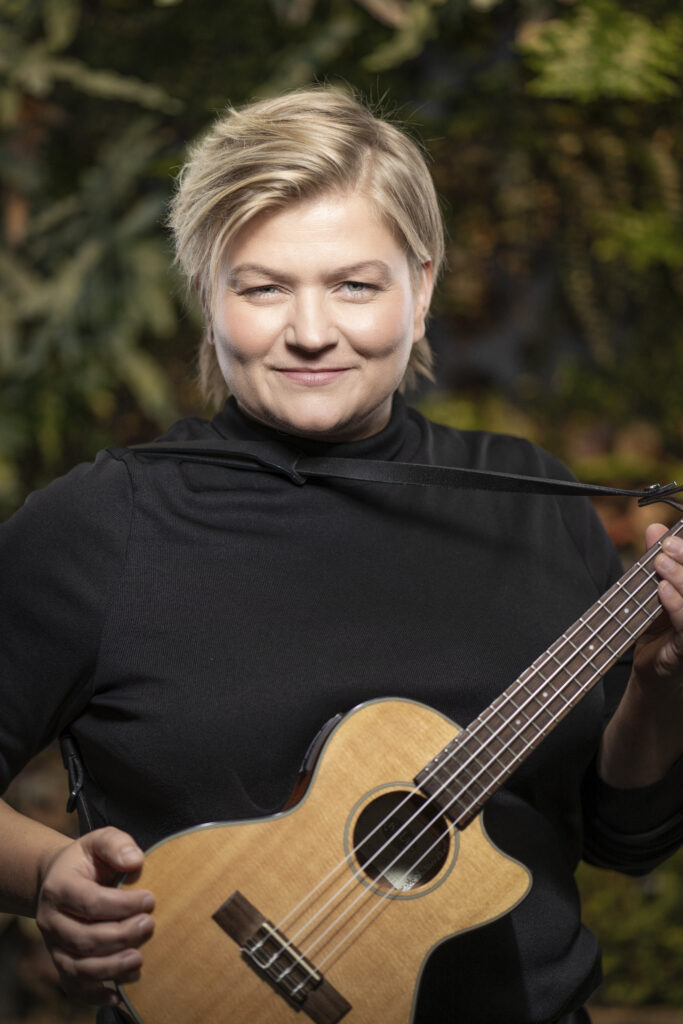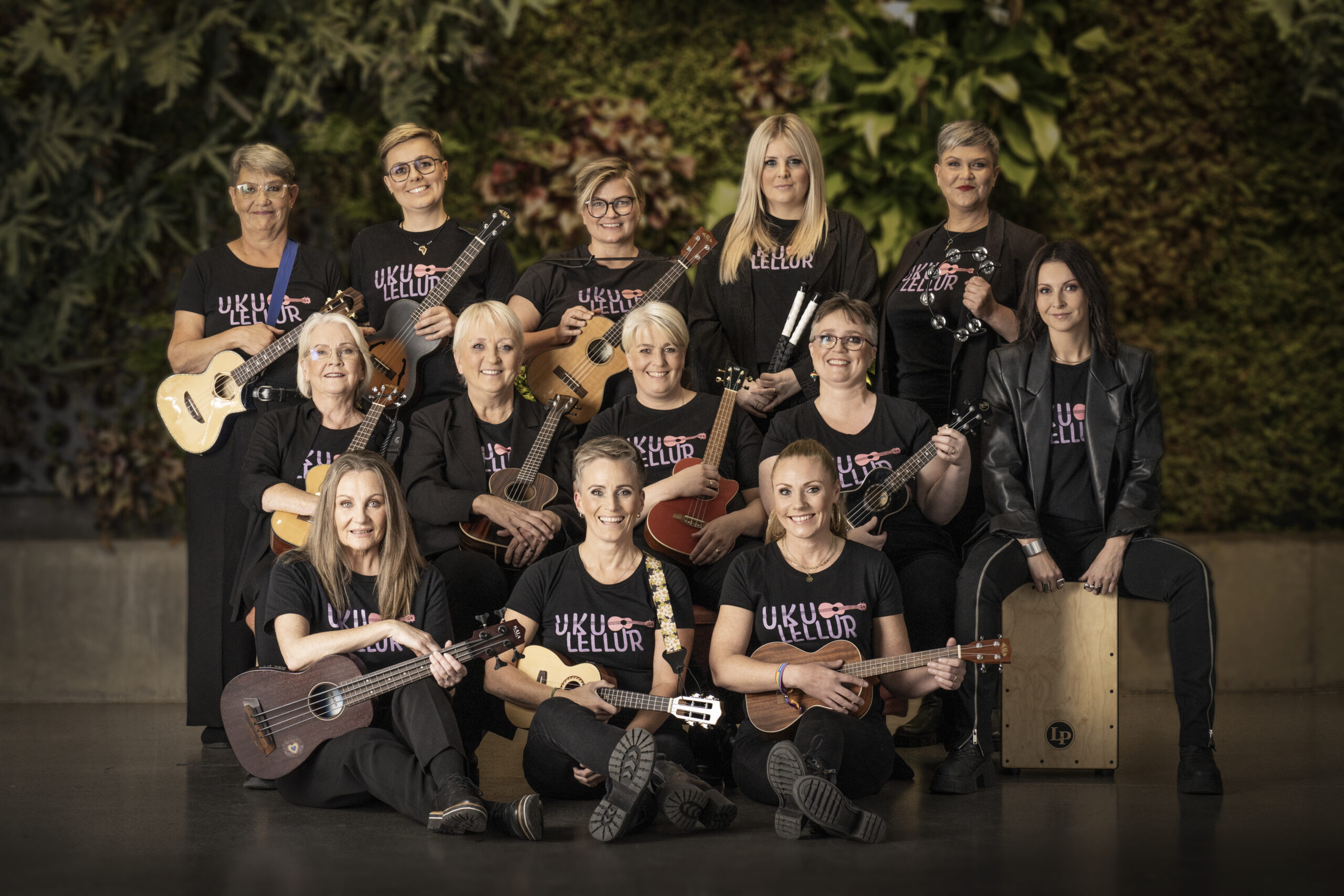Iceland’s Pioneer Queer Band Changing the World One Song at a Time.
Iceland is well-known for being a country that has delivered a lot of incredible music artists to the world. The music scene in Iceland is diverse, with artists from various genres such as folk, rock, electronic and indie. Most people have heard of Icelandic musicians like Björk, Sigur Rós, Of Monsters and Men, GusGus and Kaleo. What people might not know is that one of the hottest queer music acts coming out of Reykjavík right now, isn’t any of the people mentioned above, it’s a group of 13 Queer women playing a little wooden instrument from Hawaii… the Ukulele.
The group, called “Ukulellur”, is made up of thirteen women who are all passionate about music and promoting LGBTQ+ rights. They formed a few years ago and have quickly gained popularity both in Iceland and internationally. Their unique sound combines traditional Icelandic folk music with the playful melodies of the ukulele.
Apart from their musical talents, Ukulellur are also known for their activism and support of the LGBTQ+ community. They have performed at pride events, fundraisers, and other gatherings promoting equality and acceptance.
This Friday and Saturday, the National Theatre Of Iceland will play host to Ukulellur as they celebrate 5 years together in a show called Ukulellur – 5 Árum Betri (5 years better). Before they get strumming, GayIceland was lucky enough to catch up with three of the band’s members to find out more about how they started, what to expect and more.
GayIceland: “The band is made up of 13 members and we’re so lucky we were able to get three of you. Can you start by telling us about yourselves?”
Elísabet: “My name is Elísabet Thoroddsen. I am from Reykjavík, I’m a filmmaker and write queer YA novels when I’m not playing with Ukulellur.”
Thora: “I’m Thora Björk Smith, I’m from Reykjavík, I work for NASDAQ when I’m not playing Ukulele.”
Selma: “I’m Selma Kristín Erlendsdóttir. I’m from Hafnarfjörður. I sing in the Reykjavík Queer Choir and travel through life with my wife and children.”
GayIceland: “Tell us about how the band got together and what was your first gig?”
Elísabet: “We started the band as a joke at first – just to have fun together as a group. To us it was a funny concept, having thirteen middle aged women performing with our ukuleles. However, it soon became apparent that there actually was a gap in the market for what we were doing and all of a sudden, gigs were booked and people really wanted to hear us.”

Thora: “Our first gig was actually at my partner’s 50th birthday party – there were around 150 guests. We knew 2 songs and 3 chords and some days later we were playing live on the radio. Things happened fast.”
Selma: “I met this amazing group soon after they formed the band. I have watched them with stars in my eyes and chased them throughout the world to watch them play. My first real gig will be now at the end of October in Þjóðleikhúskjallarinn.”
Elísabet: “Through our music, we seek to enrich culture and music by writing lyrics that deal with the realities of women of all ages, especially queer women. We write about topics that generally are hard to find in music, such as menopause, reading glasses, queer love, lesbian stereotypes and that weird group of people – straight people.”
Our first gig was actually at my partner’s 50th birthday party – there were around 150 guests. We knew 2 songs and 3 chords and some days later we were playing live on the radio.
GayIceland: “Did you all know how to play the ukulele before joining the band?”
Elísabet: “Nope, I did, and a few others a little bit but most of us started from scratch. We have a bass player and two percussionists as well.”
Thora: “I was surprised when I was asked to join the band. I did not have a ukulele and didn’t know how to play. Before the first practice I went to the store, bought an instrument and after that there was no turning back.”
Selma: “I think they thought I could play when they invited me to join the band, but the truth is I did not know a single key.”
GayIceland: “What do you think makes a ukulele band so different from other kinds of bands?”
Elísabet: “The sound of the ukulele makes everyone smile – it is just a joyful instrument and makes everything fun when playing it.”
Thora: “…yes and some people find it lame, but we have made it cool.”
Elísabet: “I agree, it doesn’t get any cooler than middle-aged women with ukuleles!”

GayIceland: “Does your band have a favourite song you love to perform? If so, what is it?”
Elísabet: “We have so many songs so I find it hard to choose just one. One of my favourites is called “Straight People” and is about the weird things straight people do sometimes when they find out that I am a lesbian. They say things like, “hey I know a lesbian, maybe you know her?” or, “I used to work with a lesbian.” We just turn it around in the lyrics so we ask straight people all the questions we have gotten. I mean, how would they raise their kids? And stuff like that.”
Thora: “My favourite is called 22 and is a nostalgic song about the “good” old times when queer people were few and you meet all your friends and lovers in the same bar. That bar was located where Kiki is now, on Laugavegur 22, so that’s where the name came from.”
Selma: “They are so many. I suppose it is the song “Dótakassi Lesbíunnar” – or the Lesbian toolbox. That one is amusing.”
We write about topics that generally are hard to find in music, such as menopause, reading glasses, queer love, lesbian stereotypes and that weird group of people – straight people.
GayIceland: “You are a collective of queer older women, a group of the LGBTQIA+ community that is often underrepresented. Can you tell us a bit about why representation for queer older women is important? Do you ever feel a lot of pressure because of the fact that you’re kind of pioneers in a way?”
Elísabet: “I personally don’t feel pressure, I feel a need to continue doing this, to tell our stories and take the space that we kind of have to fight for. There is so little representation and I feel an urge to be more visible and do more. By doing that I get to meet other people that are just like us. It is powerful to know that you are not the only gay in the village!”
Thora: “We are actually not all that old, we are at different ages and there are 40 years apart from the oldest to the youngest. I personally did not think about this visibility in the beginning and notice that queer women are underrepresented. I just wanted to have fun and our aim is of course always to have fun and make sure our audience is having fun as well. But I also feel that we are now more political than we used to be, we feel we need to because of ugly discussions about queer people.
Originally our lyrics were about being a lesbian or middle aged or both. But now we also sing about people that are filled with obsession, that don’t want to hear or understand the truth and are stuck in the past and old prejudice.”
Selma: “Yes it is important in so many ways, but first and foremost fun.”
GayIceland: “What is the general vibe like at one of your concerts?”
Elísabet: “It is joyful and fun. Female and queer empowered.”

GayIceland: “What would you say has been the most incredible opportunity you’ve had as a band?”
Elísabet: “We have had so many incredible opportunities! I would say that playing for Danish royalty at Copenhagen City Hall was absolutely one of them. We also got to perform with Taylor Mac at the Reykjavik Art Festival, which was quite big.”
Thora: “The Taylor Mac show was the best – that was also so queer!”
GayIceland: “Do you have any concerts coming up?”
Thora: “Yes, there is a concert in Þjóðleikhúskjallarinn (The National Theatre of Iceland) on Friday October 27th and Saturday October 28th, happy hour time at 17:00 both days. Get your Tickets to Ukulellur 5 Árum Betri (5 years better) HERE!”
GayIceland: “What advice would you give to GayIceland readers who want to start playing ukulele?”
Elísabet: “Get yourself a ukulele, open a browser, google your favourite song with chords and start playing! You’ll find everything you need to know online. Even better if you find someone to play the ukulele with.”
Selma: “Start practising right away! Don’t wait until you are invited to join a band to start!”
Photos / Jakob Jóhannsson


